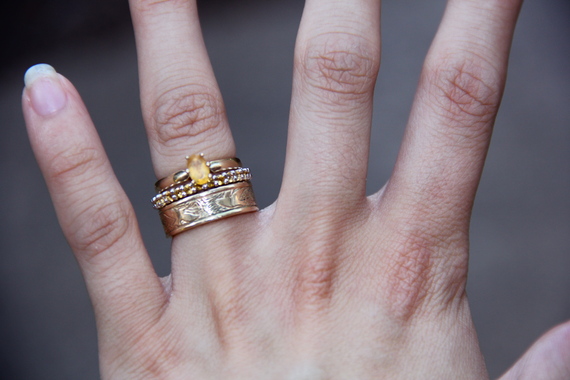I remember hearing that question at age 16 while I sat outside during a break in instruction at a summer language immersion program. The inquirer was a boy my age, someone I suspected had a crush on me, but I didn't care to find out. I just wanted to soak a bit of sun before the next grammar lesson. The boy lingered as I pulled out my sunglasses.
It was 2006, but I could've played a role in a movie made 30 or 40 years earlier. My bell-bottom jeans had big holes in the knees; my long, curly hair hung over my red peasant blouse. Though I identified as a feminist, the look was more affected in that self-conscious high school way than it was any philosophical marker. I appreciated that the struggles and sacrifices of First Wave feminists afforded me more freedom and comfort than anything ever known by generations of women before me, yet I lacked their stereotyped anger and aggression. Had Maureen Dowd asked me, "Are men necessary?" I would have answered yes. Women's problems do not exist simply because men exist; they exist because of societal conditioning. I understood, on an intellectual level and, to a lesser degree, on an emotional level, First Wave anger, but I did not live it. I had choice, or at least the illusion of choice was vivid enough to fool my teenage self.
"I don't hate men," I said.
The boy replied, "But you never flirt with guys."
When I told him I didn't have to, I immediately regretted my defensiveness. While I had no regrets about catering to his desires, I did regret not fully expressing my sexuality. At that time, I feared that flirting indicated sincere sexual interest, that to flirt was to invite, even if I wanted to have smiling at a cute guy end with smiling. For the next couple of years, I blamed myself for this conundrum, of wanting to have fun without my intentions being misconstrued. I knew I did not want to become the girl who "asked for it." The prospect of being misinterpreted, raped, humiliated, and distrusted terrified me.
As a married woman, I still occasionally worry about how men will perceive a light touch on the shoulder or a compliment. One main difference between then and now is the presence of my wedding ring. Though grateful for the symbol of love and commitment, I resent that my ring also symbolizes ownership. Once a flirting man spots my wedding ring, he's less upset if I don't respond to his advances. Whether he knows my husband or not, the man in question considers him a threat.
Before I was married, in lieu of a ring, I embraced a common tactic: blurting out, "I have a boyfriend," when I wanted a man to leave me alone. While that often halted a man's advances, sometimes the conversation would continue, anyway. "What's his name?" "Does he treat you right?" "What's he doing now?" "I'll show you a better time than he ever can."
The solution lies in closing what J.D. Trout calls the empathy gap -- not in hating men, not in tossing my ring, not in remaining ever-vigilant to the point of paranoia, but in teaching everyone to teach each other empathy. That includes recognizing that women are people, not vessels, and deserve the right to self-determination. An educated society knows this and yet the double-standard for women persists. "Our problem," writes Trout, "is that the genuinely good options aren't available to everybody. ... The idea that people can choose what they want is an oversimplification, and a dangerous one."
The illusion of women's choice then is that -- an illusion -- and we suffer in social spaces far beyond frat parties because of it. We suffer when we are young or old, married or unmarried. We suffer because we are women.

